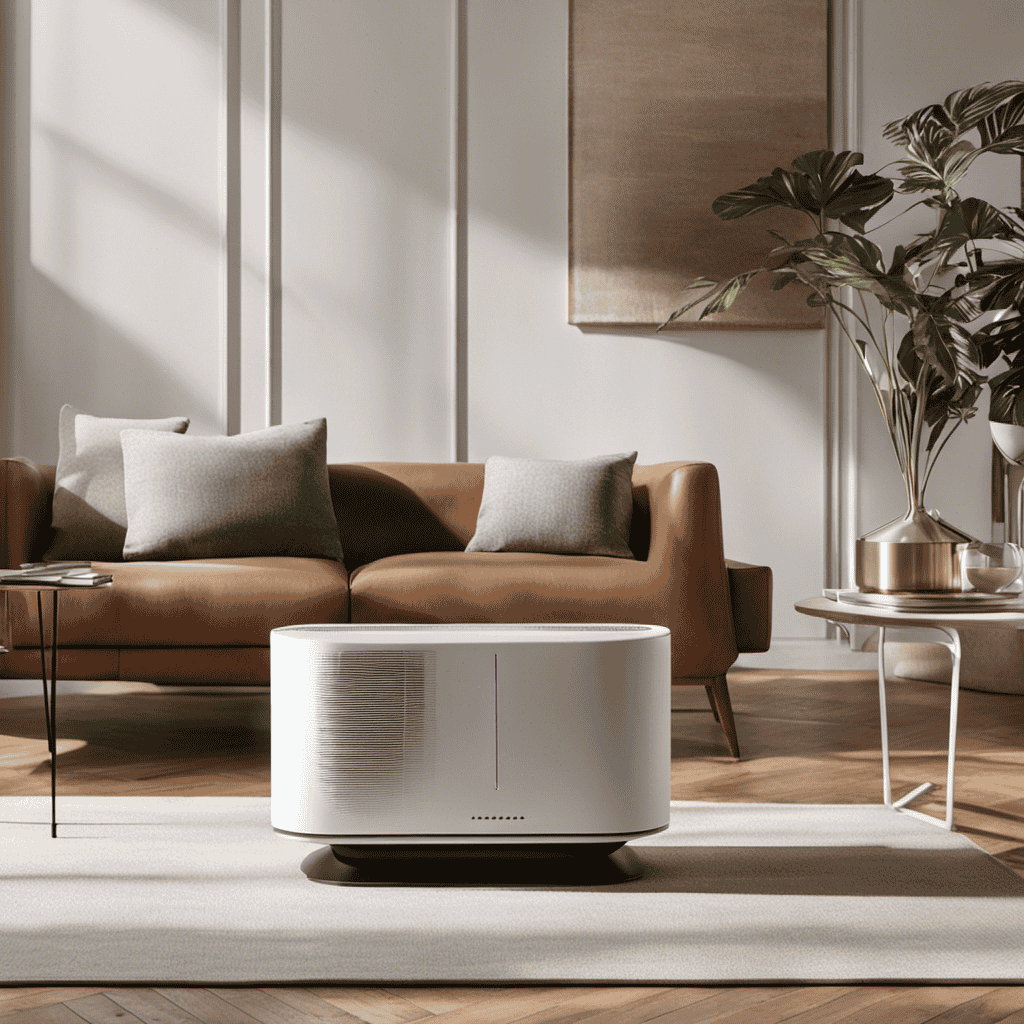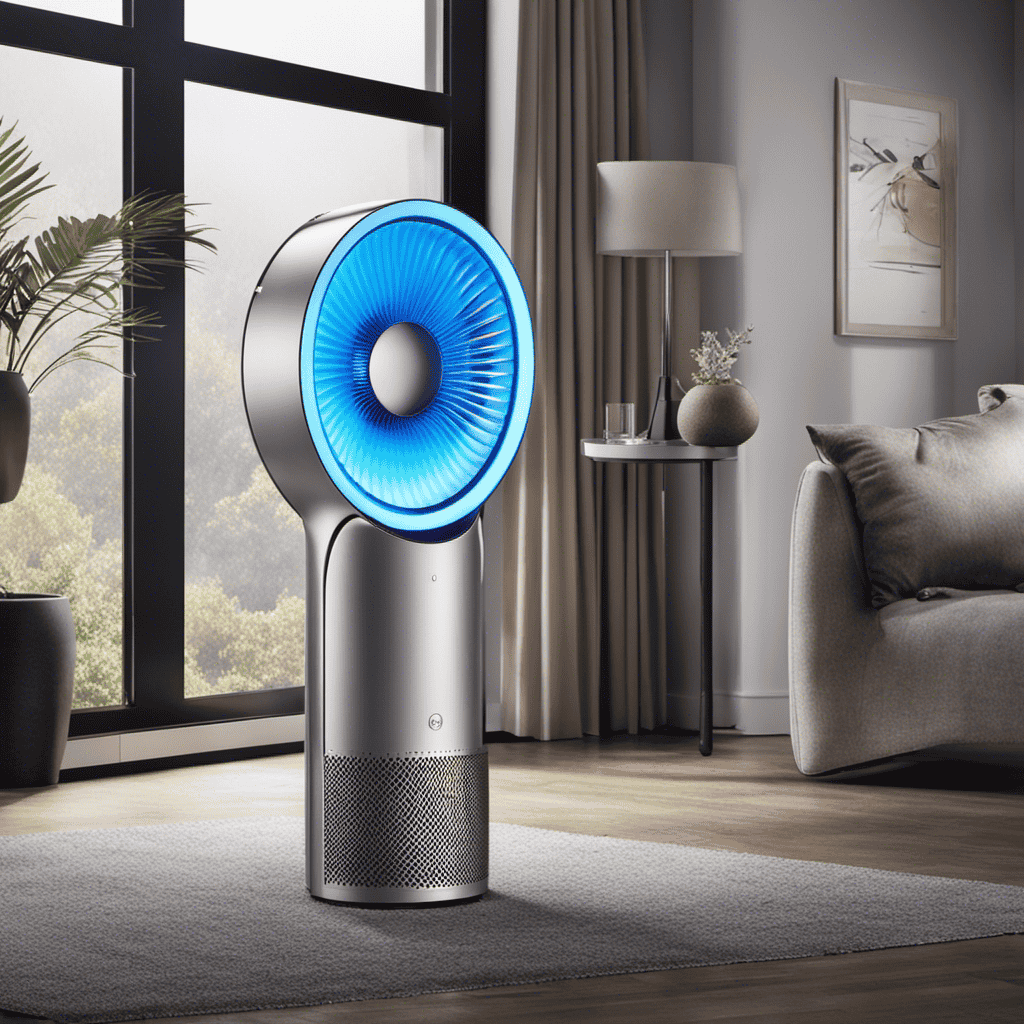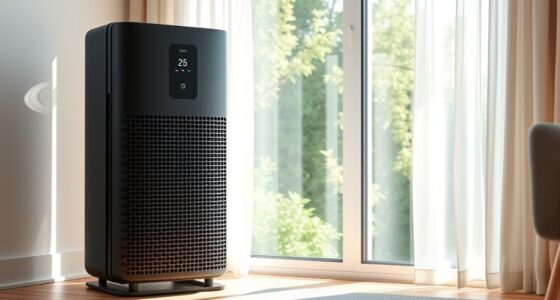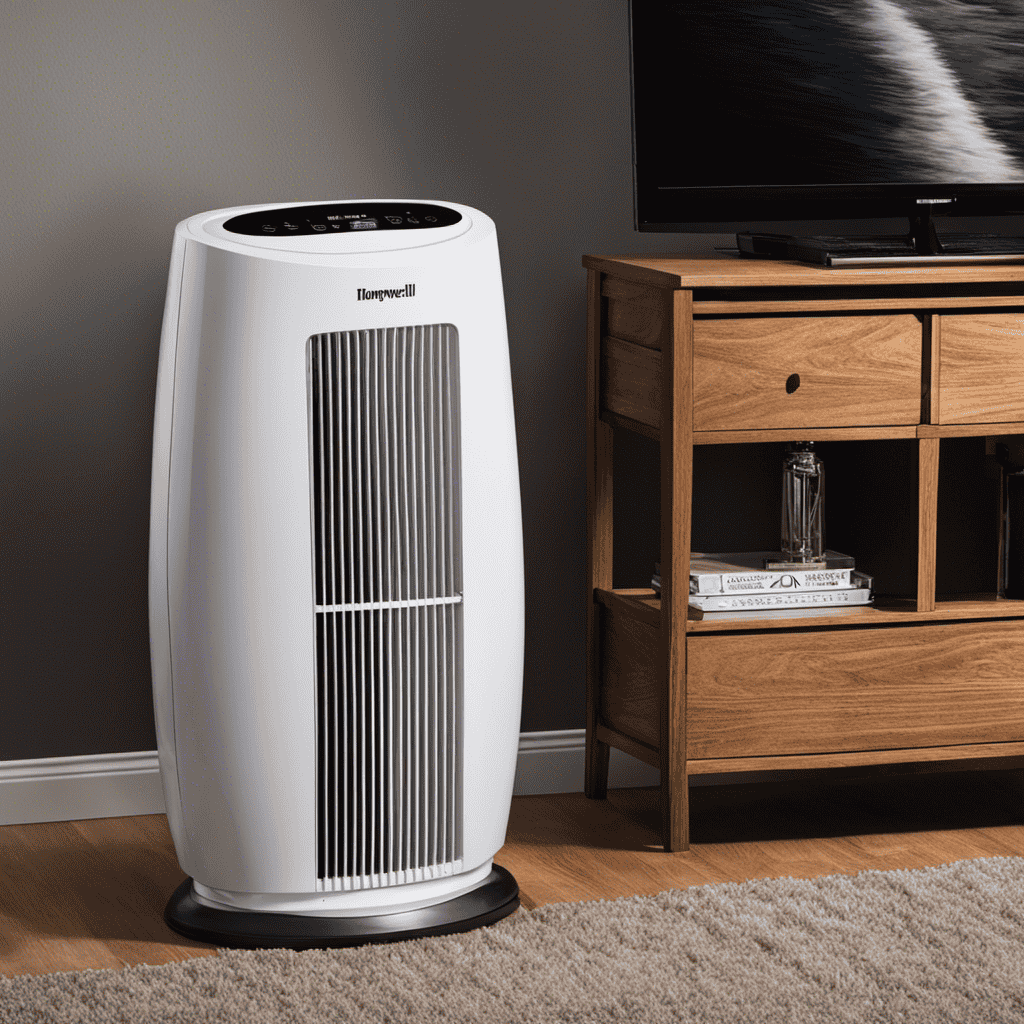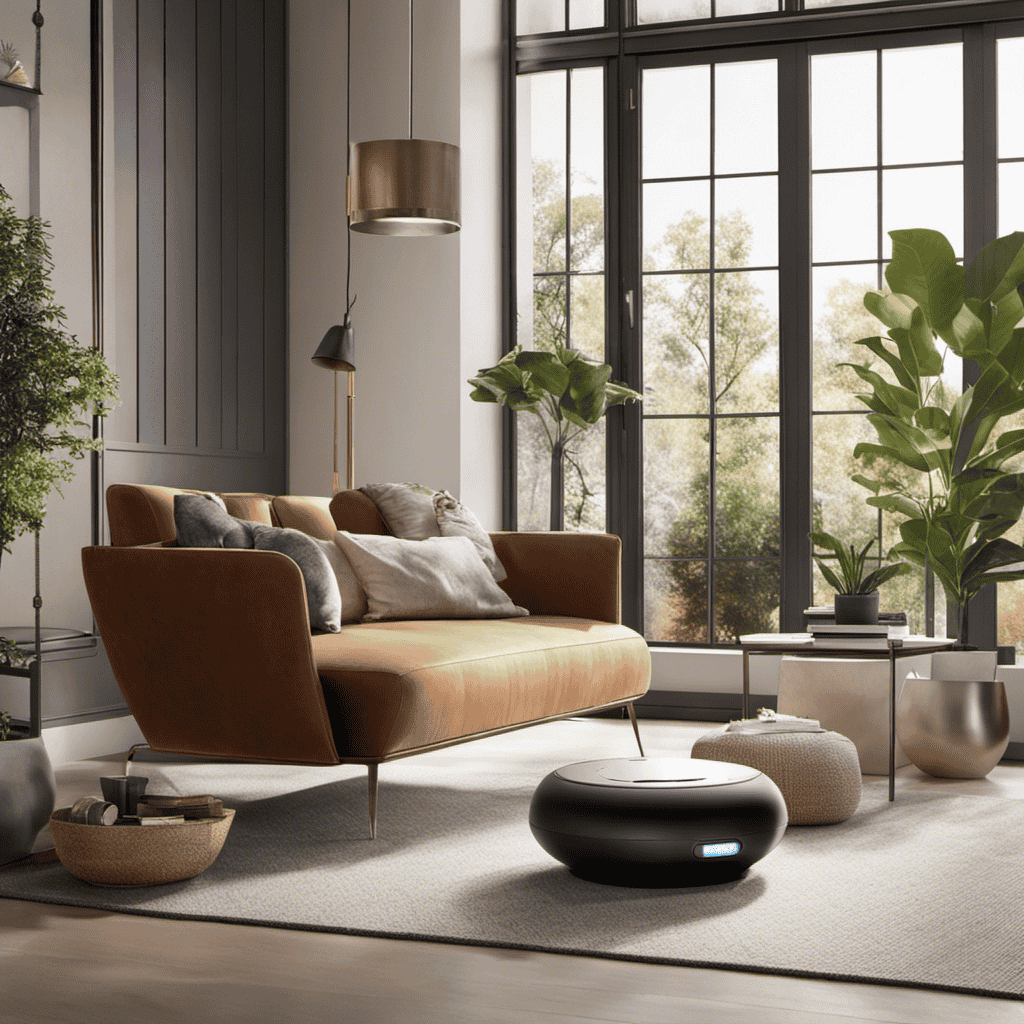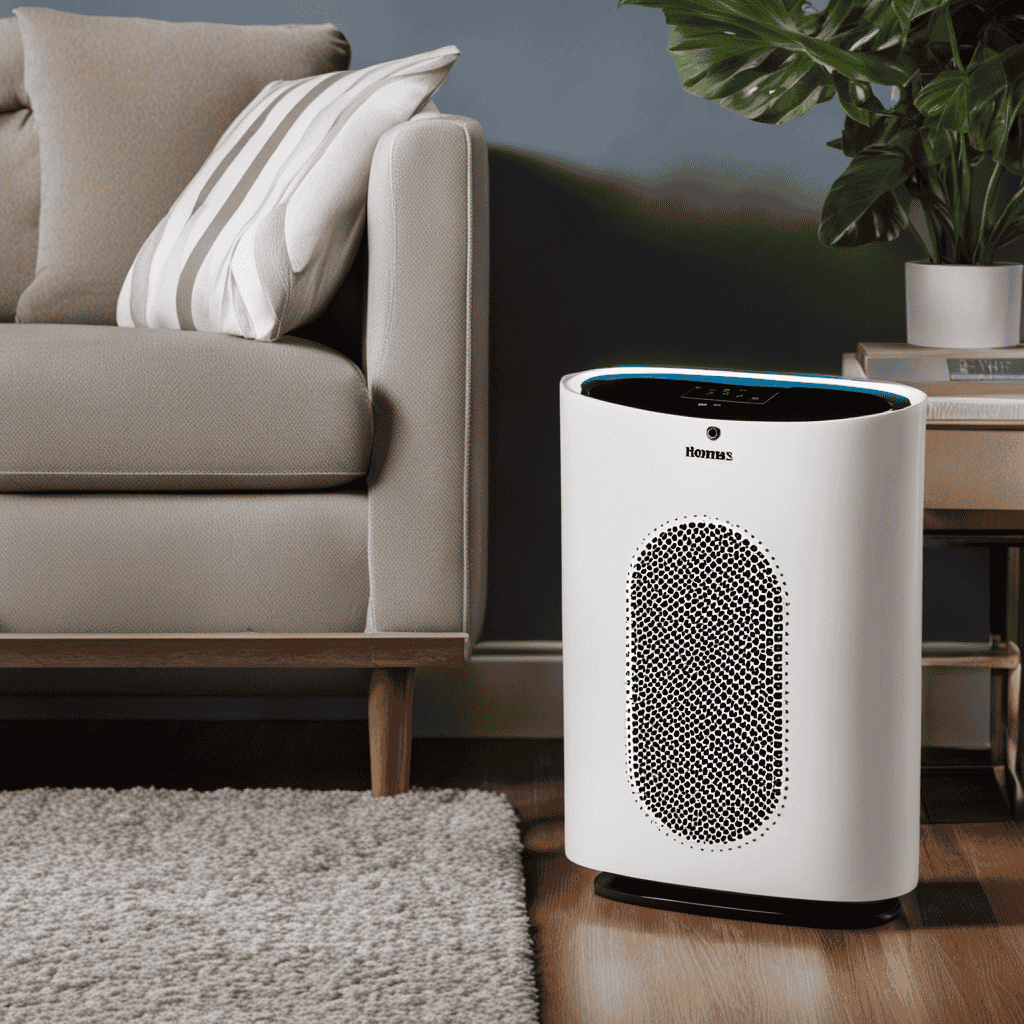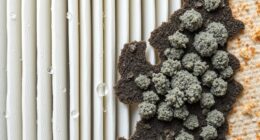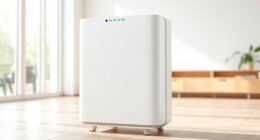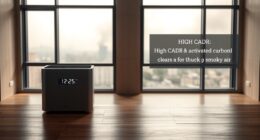I have always been curious about how to enhance the air quality in my home, particularly because of my allergies. This led me to explore true HEPA air purifiers.
These devices claim to effectively remove allergens and pollutants from the air, providing cleaner and healthier indoor environments.
In this article, I’ll delve into the basics of HEPA technology, explain how true HEPA filters work, highlight key features of these purifiers, and explore the benefits of using them.
Let’s get started!
Key Takeaways
- True HEPA filters are certified to capture 99.97% of particles as small as 0.3 microns, making them highly effective in removing dust, pollen, pet dander, mold spores, bacteria, and viruses.
- True HEPA filters outperform other filtration methods like activated carbon or ionizers, ensuring that the smallest and most harmful particles are captured in the air.
- True HEPA air purifiers work by forcing air through the filter using a fan, where trapped particles are permanently captured, preventing their release back into the air.
- Using a True HEPA air purifier can provide numerous benefits, including the removal of common allergens, improvement in respiratory health, reduction in symptoms like sneezing and coughing, and the creation of a cleaner and fresher environment that improves sleep quality.
The Basics of HEPA Technology
HEPA technology uses a high-efficiency particulate air filter to capture particles as small as 0.3 microns. This type of filter is made up of a dense mesh of fibers that create a maze-like structure. As air passes through the filter, these fibers trap and retain particles, preventing them from circulating back into the air.
One of the major advantages of HEPA filtration is its ability to remove a wide range of contaminants, including dust, pollen, pet dander, mold spores, and even bacteria and viruses. This makes it an effective solution for improving indoor air quality and reducing the risk of respiratory problems.
Understanding the true HEPA filters is important as not all filters labeled as ‘HEPA’ meet the same standards.
Understanding True HEPA Filters
To get a better understanding, you should know that a true HEPA filter effectively traps tiny particles like dust and allergens. When it comes to air purification, HEPA filters are considered the gold standard.
HEPA stands for High Efficiency Particulate Air, and true HEPA filters are certified to meet strict standards set by the United States Department of Energy. HEPA certification ensures that the filter can capture 99.97% of particles as small as 0.3 microns in size.
This level of filtration is unmatched by other common filtration methods like activated carbon or ionizers. While these other methods may be effective at removing odors or particles larger than 0.3 microns, they fall short when it comes to capturing the smallest and most harmful particles found in the air.
How Does a True HEPA Air Purifier Work
If you’re curious about how it works, a true HEPA filter uses a dense mat of fibers to trap and remove tiny particles from the air you breathe. Here’s how it works:
-
HEPA stands for High Efficiency Particulate Air. These filters are capable of capturing particles as small as 0.3 microns.
-
The fibers in a true HEPA filter create a labyrinth-like structure. As air passes through, the particles get trapped within the fibers.
-
The filter is made up of randomly arranged fibers that create a large surface area, increasing the chances of particle capture.
-
The air is forced through the filter using a fan, ensuring that all the air in the room passes through the filter multiple times.
-
The trapped particles are permanently captured, preventing them from being released back into the air.
When choosing the best air purifier, look for one that uses a true HEPA filter and has a high Clean Air Delivery Rate (CADR) to ensure effective air purification.
Understanding the science behind air purification can help you make an informed decision.
Key Features of True HEPA Air Purifiers
When selecting an air purifier, you’ll want to consider the key features that ensure effective purification. One important factor to consider is the brand of the air purifier. Different brands may offer varying features and levels of performance. It is important to research and compare the different brands to find the one that best suits your needs.
Another aspect to consider is the cost of the air purifier. While cost should not be the sole determining factor, it is important to compare prices and value for money. Some air purifiers may be more expensive but offer additional features or better filtration capabilities.
Ultimately, finding the right air purifier involves considering the key features, comparing different brands, and conducting a cost comparison to make an informed decision.
The Importance of Clean Air in Your Home
Clean air in your home is crucial for maintaining a healthy living environment. The importance of air quality cannot be understated, as it directly impacts our overall well-being. Here are some key health benefits of clean air:
-
Reduced respiratory issues: Clean air helps to minimize the risk of respiratory problems such as asthma, allergies, and bronchitis.
-
Improved sleep quality: Breathing in clean air promotes better sleep patterns, leading to a more restful night’s sleep.
-
Enhanced cognitive function: Studies have shown that clean air can improve cognitive performance, including memory, attention, and problem-solving skills.
-
Strengthened immune system: Breathing in pollutants can weaken our immune system, making us more susceptible to illnesses. Clean air helps to bolster our body’s defenses.
-
Reduced stress levels: Fresh air has been proven to reduce stress and anxiety levels, promoting mental well-being.
Investing in an air purifier with a True HEPA filter can help ensure that the air in your home is clean and free from harmful pollutants, providing these essential health benefits.
Differentiating True HEPA From Other Filter Types
To distinguish between different types of filters, you should consider factors like efficiency, particle size, and overall performance.
When it comes to True HEPA filters, there are several differentiating features that set them apart from other filters.
First and foremost, True HEPA filters have a high efficiency rating of 99.97% in capturing particles as small as 0.3 microns. This makes them highly effective in removing allergens, dust, and other harmful particles from the air.
Additionally, True HEPA filters have a larger surface area, allowing for better filtration and longer filter life.
Compared to other filters, True HEPA filters provide superior performance in improving indoor air quality and reducing the risk of respiratory issues.
These advantages make True HEPA filters the preferred choice for those seeking cleaner and healthier air in their homes or offices.
Choosing the Right True HEPA Air Purifier for Your Needs
If you’re looking for the right True HEPA filter, consider factors like room size, noise level, and additional features. When choosing the right brand, it’s important to evaluate the performance and efficiency of the True HEPA air purifier.
Here are some key points to consider:
-
Room size: Determine the square footage of the room you want to purify and choose a True HEPA air purifier that is suitable for that size.
-
Noise level: Some air purifiers can be quite loud, so if noise is a concern for you, look for a model that offers quiet operation.
-
Additional features: Consider what additional features you might need, such as an automatic timer, air quality sensor, or remote control.
-
Filter replacement: Check how often the filters need to be replaced and the cost of replacement filters.
-
Energy efficiency: Look for an Energy Star certified True HEPA air purifier to ensure it operates efficiently and doesn’t consume excess energy.
By considering these factors, you can choose the right True HEPA air purifier that meets your specific needs.
Now let’s explore the benefits of using a True HEPA air purifier.
Benefits of Using a True HEPA Air Purifier
When it comes to improving your indoor air quality, you’ll be amazed at the benefits you can experience by using a True HEPA air purifier.
A True HEPA air purifier is designed to capture up to 99.97% of airborne particles as small as 0.3 microns. This means that it can effectively remove common allergens such as pollen, dust mites, pet dander, and mold spores from the air.
By reducing the presence of these allergens, a True HEPA air purifier can greatly improve respiratory health, especially for individuals with allergies or asthma. Studies have shown that using a True HEPA air purifier can help reduce symptoms such as sneezing, coughing, and congestion.
It can also create a cleaner and fresher environment, allowing you to breathe easier and sleep better. So, if you’re looking to improve your respiratory health and reduce allergies, a True HEPA air purifier is a worthwhile investment.
Common Misconceptions About True HEPA Air Purifiers
Don’t be fooled by some common misconceptions about HEPA air purifiers. While they are highly effective in removing airborne particles and improving indoor air quality, there are a few misunderstandings that need to be addressed.
Here are some key points to consider:
-
HEPA filters only capture large particles: This is not true. True HEPA filters are designed to trap particles as small as 0.3 microns in size, including allergens, bacteria, and viruses.
-
HEPA filters eliminate odors: While HEPA filters can help reduce odors by removing some particles that cause them, they are not specifically designed for odor elimination. Carbon filters are more effective in eliminating odors.
-
HEPA filters don’t need to be replaced: HEPA filters do need to be replaced regularly to maintain their effectiveness. The lifespan of a HEPA filter depends on factors such as usage and air quality.
-
HEPA filters remove all harmful substances: HEPA filters are effective at removing airborne particles, but they are not designed to remove gases, chemicals, or volatile organic compounds (VOCs) from the air.
-
HEPA filters make the air too dry: HEPA filters do not remove moisture from the air, so they do not contribute to dry air. Humidity levels are primarily controlled by separate devices such as humidifiers or dehumidifiers.
Maintaining and Cleaning Your True HEPA Air Purifier
When it comes to maintaining and cleaning your True HEPA air purifier, there are several key points to consider.
First and foremost, proper filter replacement is crucial to ensure the device continues to effectively remove airborne particles.
Secondly, knowing the correct cleaning techniques and frequency is essential in preventing the buildup of dirt and dust on the purifier’s exterior.
Lastly, by diligently maintaining your True HEPA air purifier, you can ensure its optimal performance and prolong its lifespan, allowing you to enjoy cleaner and healthier indoor air.
Proper Filter Replacement
Make sure you’re replacing the filter in your true HEPA air purifier regularly to maintain its effectiveness. A clean and properly functioning filter is crucial for ensuring that your air purifier is able to effectively remove harmful particles from the air.
Here are the key things you need to know about filter maintenance and lifespan:
-
Check the manufacturer’s instructions: Different air purifiers have different filter replacement schedules, so it’s important to follow the guidelines provided by the manufacturer.
-
Monitor air quality: If you notice a decline in air quality or an increase in allergies, it may be a sign that your filter needs to be replaced.
-
Keep track of usage: Filters have a limited lifespan, typically ranging from 6 months to 1 year, depending on the air purifier model and usage.
-
Consider the environment: If you live in an area with high pollution or have pets, you may need to replace the filter more frequently.
-
Use genuine replacement filters: Using off-brand or incompatible filters can compromise the effectiveness of your air purifier.
Cleaning Techniques and Frequency
When it comes to cleaning a true HEPA air purifier, it is important to understand the frequency and techniques that will ensure its optimal performance. Regular cleaning not only helps maintain the efficiency of the device but also extends its lifespan. The table below outlines effective cleaning techniques and their recommended frequency:
| Cleaning Technique | Frequency |
|---|---|
| Dusting the exterior | Weekly |
| Vacuuming the filters | Monthly |
| Washing the filters | Every 3-6 months |
Dusting the exterior of the air purifier on a weekly basis helps remove any accumulated dust and debris. Vacuuming the filters monthly helps to eliminate larger particles and dirt. Washing the filters every 3-6 months is essential to remove trapped contaminants effectively. However, it is crucial to follow the manufacturer’s instructions for proper cleaning and maintenance. By adhering to these cleaning techniques and frequencies, you can ensure that your true HEPA air purifier continues to provide clean and fresh air for you and your family.
Maintaining Optimal Performance
Regular cleaning and maintenance are essential for maintaining the optimal performance of your HEPA air purifier. Here are some tips to help you extend the filter lifespan and troubleshoot common issues:
- Clean or replace the pre-filter regularly to prevent larger particles from clogging the HEPA filter.
- Vacuum the exterior of the unit to remove dust and debris that can accumulate over time.
- Check the filter indicator light, if available, to determine when it’s time to replace the filter.
- Consider using a filter-cleaning solution or washing the filter with water to remove stubborn dirt and particles.
- Ensure proper placement of the air purifier, away from obstructions and at a suitable distance from walls and furniture.
Enhancing Indoor Air Quality With True HEPA Air Purifiers
When it comes to indoor air quality, one of the most effective ways to enhance it is by using a True HEPA air purifier.
These devices are equipped with high-efficiency particulate air (HEPA) filters that are capable of capturing particles as small as 0.3 microns.
This level of effectiveness ensures that the air you breathe is free from allergens, dust, pet dander, and other harmful pollutants, providing numerous benefits for your health and overall well-being.
HEPA Filter Effectiveness
To determine the effectiveness of a HEPA filter, you can check for its certification and look for a high CADR rating. Here are some key points to consider when it comes to HEPA filter maintenance and lifespan:
-
Regularly clean or replace the filter: Over time, a HEPA filter can become clogged with pollutants, reducing its effectiveness. Cleaning or replacing the filter as recommended by the manufacturer is crucial to maintain optimal performance.
-
Avoid exposure to moisture: Moisture can damage the filter and promote the growth of mold and bacteria. Keep the filter in a dry environment to ensure its longevity.
-
Follow manufacturer instructions: Each HEPA filter may have specific instructions for maintenance and lifespan. Adhering to these guidelines will help maximize the filter’s efficiency.
-
Consider the quality of the filter: Not all HEPA filters are created equal. Investing in a high-quality filter can result in a longer lifespan and better air purification.
-
Monitor the filter’s performance: Keep an eye on the filter’s performance over time. If you notice a decrease in air quality or airflow, it may be time to clean or replace the filter.
Benefits of Clean Air
One of the benefits of having clean indoor air is that it can help improve overall health and well-being. Air pollution, particularly indoor air pollution, is a major concern for respiratory health. Indoor air can contain various pollutants such as dust, allergens, volatile organic compounds (VOCs), and even harmful gases like carbon monoxide.
These pollutants can irritate the respiratory system and exacerbate existing respiratory conditions such as asthma and allergies. By using air purifiers that effectively remove these pollutants, we can reduce the risk of respiratory problems and improve air quality. Research has shown that clean indoor air can lead to fewer respiratory symptoms, decreased medication use, and improved lung function.
Therefore, investing in a true HEPA air purifier is a practical step towards maintaining good respiratory health and overall well-being.
Frequently Asked Questions
Are All HEPA Filters the Same?
No, all HEPA filters are not the same. There are different HEPA filters available on the market, and their effectiveness can vary. It’s important to choose a true HEPA filter for maximum air purification.
Can a True HEPA Air Purifier Eliminate All Types of Indoor Air Pollutants?
Yes, a true HEPA air purifier can eliminate various types of indoor air pollutants. For example, in a study, it effectively removed allergens, dust, pet dander, and mold spores, improving air quality and reducing allergy symptoms.
How Often Should I Replace the True HEPA Filter in My Air Purifier?
I replace the true HEPA filter in my air purifier every 6-12 months. Regular cleaning ensures optimal performance and eliminates pollutants like dust, pollen, and pet dander. Using a true HEPA air purifier has numerous benefits for indoor air quality.
Can a True HEPA Air Purifier Help With Allergies and Asthma?
Can a true HEPA air purifier effectively improve indoor air quality and help with allergies and asthma? Discover the benefits of using a HEPA air purifier and how it can reduce allergens and irritants in your home.
Are There Any Potential Health Risks Associated With Using a True HEPA Air Purifier?
There are potential side effects associated with using a true HEPA air purifier, such as dryness of the air and irritation of the respiratory system. However, there is limited evidence on the long-term effects.
Conclusion
In conclusion, a True HEPA air purifier is a powerful tool for improving indoor air quality. By removing up to 99.97% of airborne particles as small as 0.3 microns, it ensures cleaner and healthier air in your home.
One interesting statistic to note is that indoor air can be up to five times more polluted than outdoor air, according to the Environmental Protection Agency (EPA). This highlights the importance of investing in a True HEPA air purifier to safeguard the health and well-being of you and your family.
